
Instagram Stories play a huge role in the life of social media users. Stories keep us updated on the lives of our loved ones, our peers, and our idols. They deliver interesting information, hilarious antics, and important updates.
That’s why Instagram Story ads can be a powerful tool for your business. You can slide right in with the Stories your audience wants to see. And because Instagram Story Ads look so similar to organic Stories, they see high levels of views and engagement.
This article is your jump start into the world of the Story ad. You’ll learn how to craft ads that capture your audience’s attention, immerse them into your world, and most importantly—make them want to learn more about your brand.
Start selling online now with Shopify
Start your free trial



What are Instagram Story ads?
Instagram Story ads are vertical, full-screen ads marketers can place in Instagram Stories. They’re almost identical to organic Stories (which are also full-screen and vertical), except for the “Sponsored” text that appears below Story ads. Campaign objectives for Story ads include reach, conversions, and brand awareness.
Instagram allows you to choose from photos, videos, and a carousel to format your Story ads. Image Story ads play for up to five seconds, and video Story ads play for up to 15 seconds. With carousel Story ads, advertisers can mix photos and videos to create one unique ad.
Instagram Story ads don’t disappear after 24 hours, as organic Instagram Stories do. Instead, Instagram lets you define the length and frequency of your ad campaign.
Why use Instagram Story ads?
Instagram Story ads are a valuable tool for getting exposure for your brand. More than 500 million people use Instagram Stories every day, with one-third of the most-seen Stories coming from brands and businesses. After one Story ends, another automatically begins, giving brands airtime amongst Stories from family, friends, and other followed accounts.
The advantages of Instagram Story ads include:
- Engaged users: use ads to engage users when they’re flipping through their Stories
- Improved brand awareness: intuitively appear in people’s Story feeds with branded ads
- Reach new audiences: leverage Instagram’s targeting features to reach users who aren’t already following your brand
Convinced Instagram Story ads can help you gain traction? Great. Now let’s dive into how you can create your own Story ad and the estimated cost of running an ad campaign.
How to create an Instagram Story ad
- Open your Facebook Ads Manager.
- Click Create Your Ad.
- Select the objective of your campaign (e.g., traffic, lead generation, downloads, or engagement).
- Define your audience, your ad budget, and the length of your ad campaign.
- Choose Instagram as the social media platform and Stories as the placement you want to use.
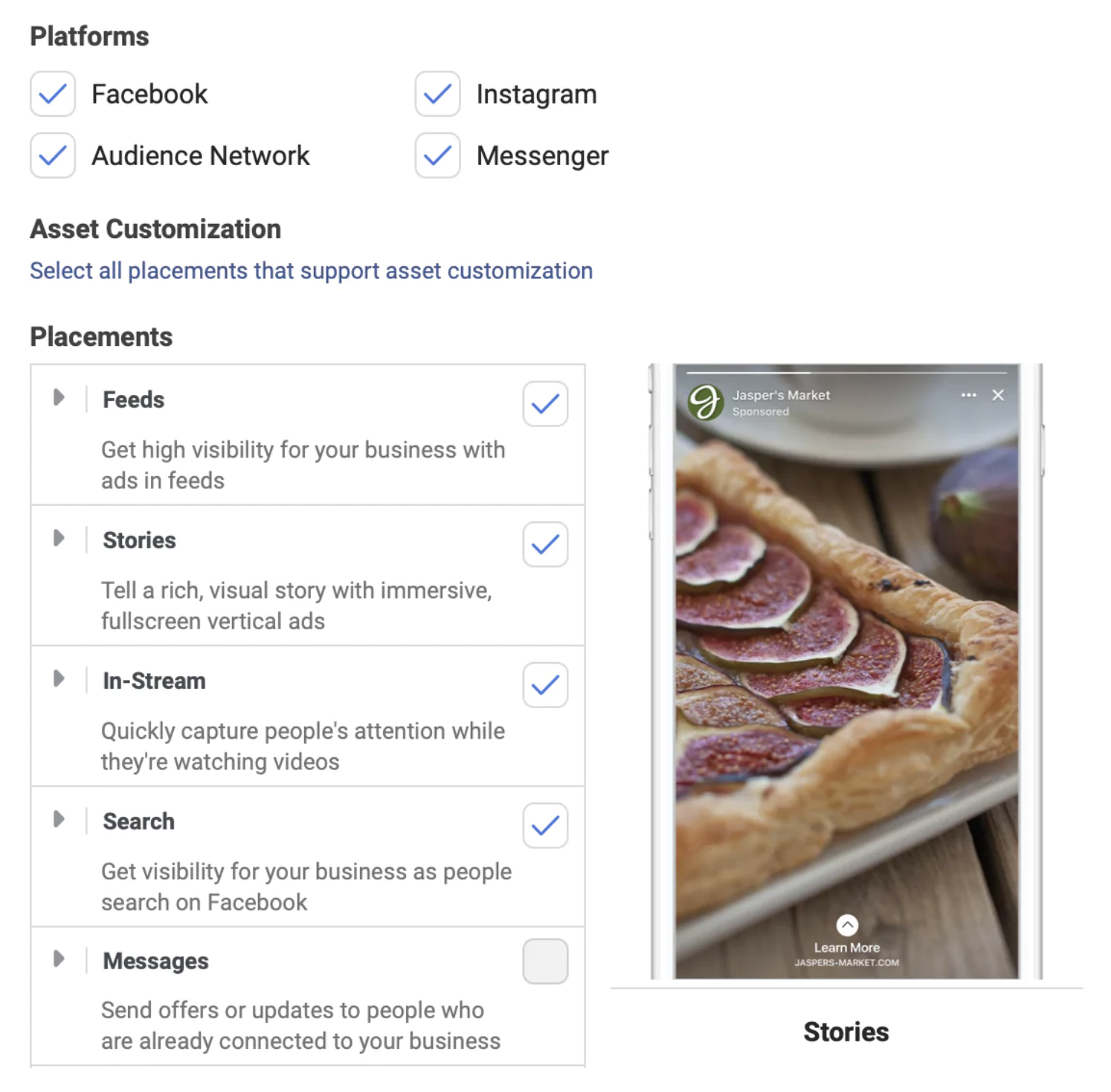
- Upload your creatives.
When creating your Story ads, make sure you sync your product catalog so viewers get the chance to purchase without leaving the Instagram app. Shopify has an excellent guide on how to do that.
Story ad dimensions
Story ads follow the vertical format, so you may be unable to use your existing media assets from other platforms. Instead, build media elements and visuals from scratch that match the following specs:
- 1080 pixels x 1920 pixels resolution (600 pixels x 1067 pixels minimum)
- 9:16 aspect ratio
- .png or .jpg for photos
- .mp4 or .mov for videos
- Maximum 30 MB for photos
- Maximum 4 GB for videos
- 5-second playback for photos
- 15-second playback for videos
Regular Instagram ads have the same requirement, except for the dimensions, which are 1080 pixels x 1080 pixels, and the play time, which goes up to 60 seconds for standard feed ads.
How much does it cost to run an Instagram Story ad campaign?
It’s difficult to pin down an exact figure because different studies on Instagram ad costs cite different averages.
One study found that Instagram feed ads cost less than Facebook ads, with the average CPC (cost per click) ranging between 20¢ and $ 2, but Instagram Story ads are even more cost-effective.
For most campaign goals, Story ads require you to pay for impressions rather than clicks, so you’ll be charged on a CPM (cost per 1,000 impressions basis). If you opt to pay per link click (or link sticker), you won’t be charged if nobody clicks on your link.
So if we consider the average CPC at face value, you’d be paying less than $ 2 per click. In fact, other research suggests that Story ads cost between 70¢ and $ 1 per click, making them one of the cheapest social media ad formats.
Calculating story ad costs
To purchase Instagram Story ads, merchants are required to enter an auction where they must establish a budget before the campaign’s launch. Merchants also need to place a bid—the highest they’re willing to pay for a viewer to complete an action (like buying a product, downloading a brochure, or watching a video).
Instagram’s algorithm evaluates all ads in the auction based on:
- The bid amount
- Ad relevance and quality (i.e., the odds of a user engaging with the ad)
- The approximate action rates (i.e., the odds of a user completing the advertiser’s desired action)
It then decides which ads to show in people’s Instagram Stories.
The cost of your Instagram Story ads is also affected by other factors, such as the time of the year and your industry. For example, general Story ad rates will increase during popular shopping holidays, like Thanksgiving and BFCM.
Tips for Instagram Story ads
1. Include a short and punchy message
In Instagram Story ads, visual content occupies most of the screen space, meaning there’s little room for text elements. So if you’re going to use text in your ads, make sure to create a short and punchy message that’s easy to read.
Take inspiration from Bolt Food’s Instagram Stories ad.
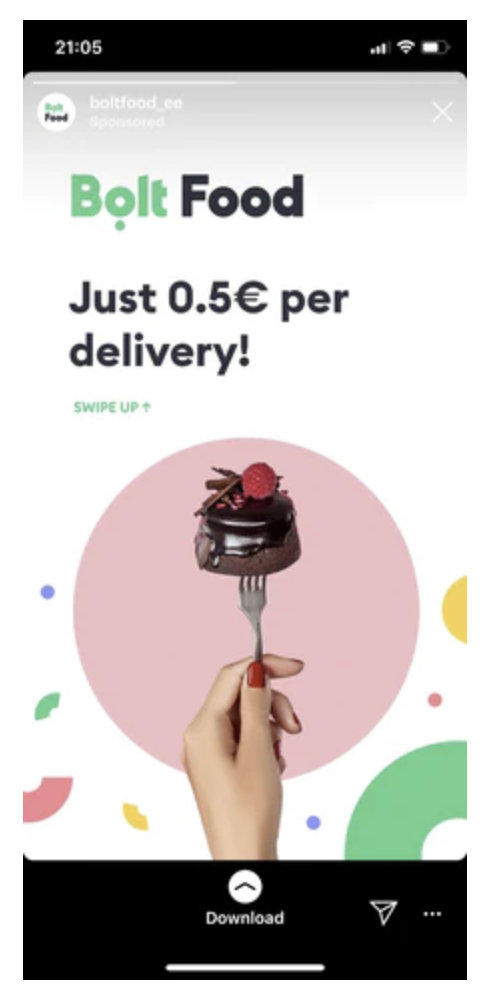
The food delivery service portrays its USP with a simple and concise message that doesn’t take up too much of the viewer’s time.
2. Add motion to your ad
According to Facebook, Stories ads with motion tend to perform better. There’s a good explanation for this: motion ignites the audience’s imagination and helps advertisers tell stories faster than they can with a static image.
Using animation is the easiest way to add motion to your ads. You can use Instagram’s built-in library of GIF stickers to make your ads pop or use a photo editing app like Mojo to apply unique animation effects to your content.
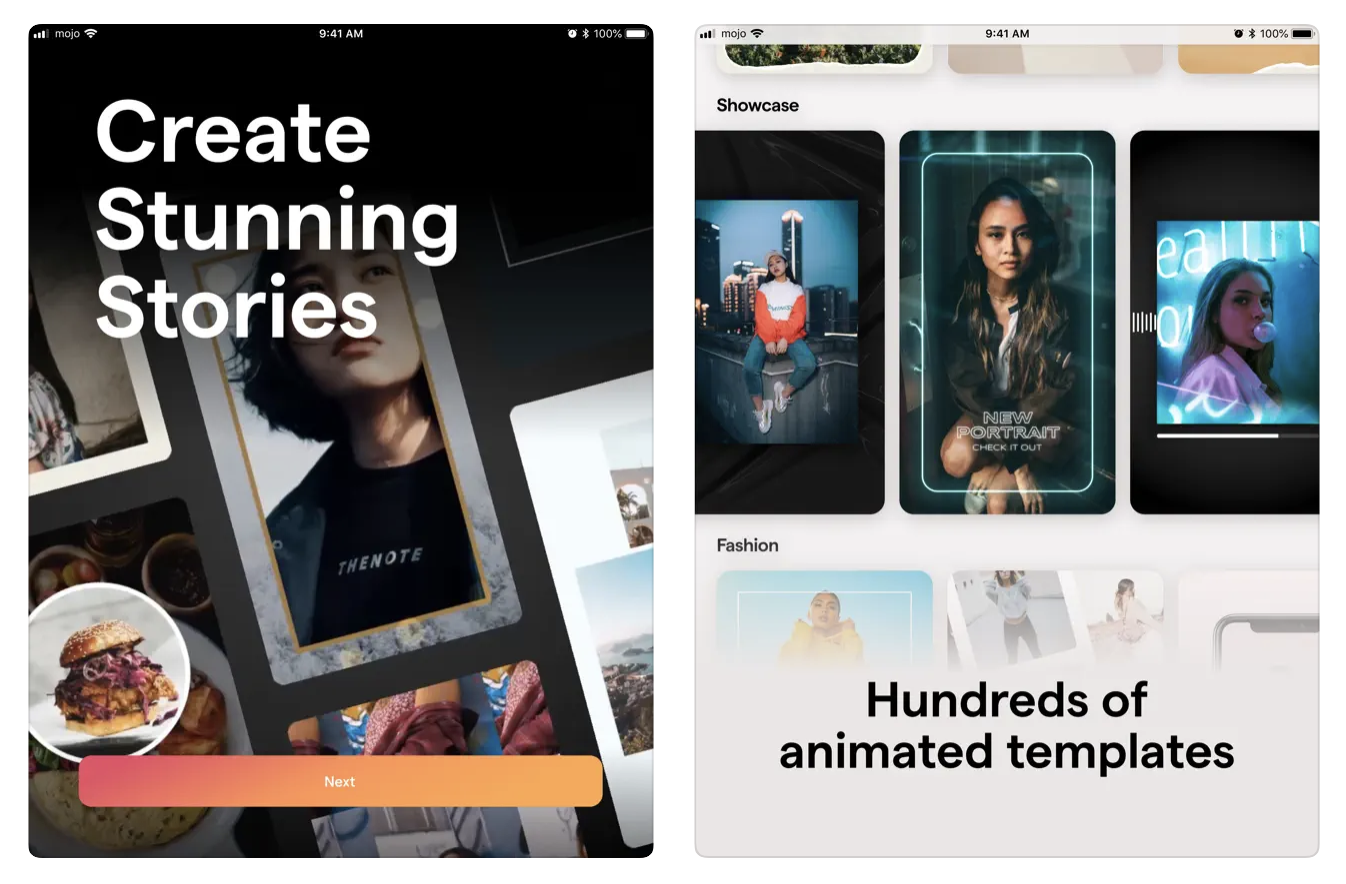
3. Showcase your brand
Brand recognition plays a key role in getting people to click on social media ads. Ensure your brand name and logo are prominently visible in your Instagram Stories ad. Use minimal fonts, colors, and design elements so that your brand visuals stand out. If you’re featuring a product that already has your logo included, ensure no other elements or objects are in the way of the item being seen.
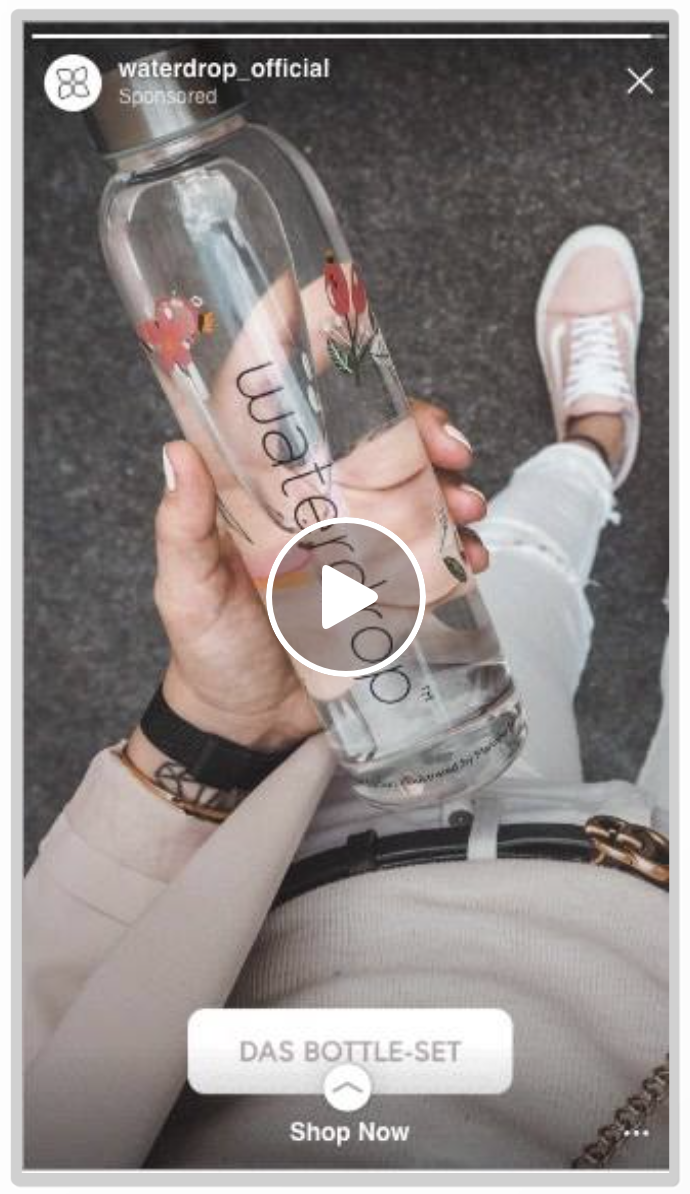
In the example above, Waterdrop puts the spotlight on the product featuring its brand name and also displays the item’s name just above the call to action.
4. Use a clear CTA
The call to action (CTA) in your Instagram Stories ads is meant to compel users to take a specific action. Use action words like Visit the Site, Shop Now, or Watch More, and direct users toward the CTA. You could even highlight the next step with a graphic to ensure the audience knows where to click.
Collabs uses an arrow to direct users to its CTA and gives a hint for what to expect when they click the link.
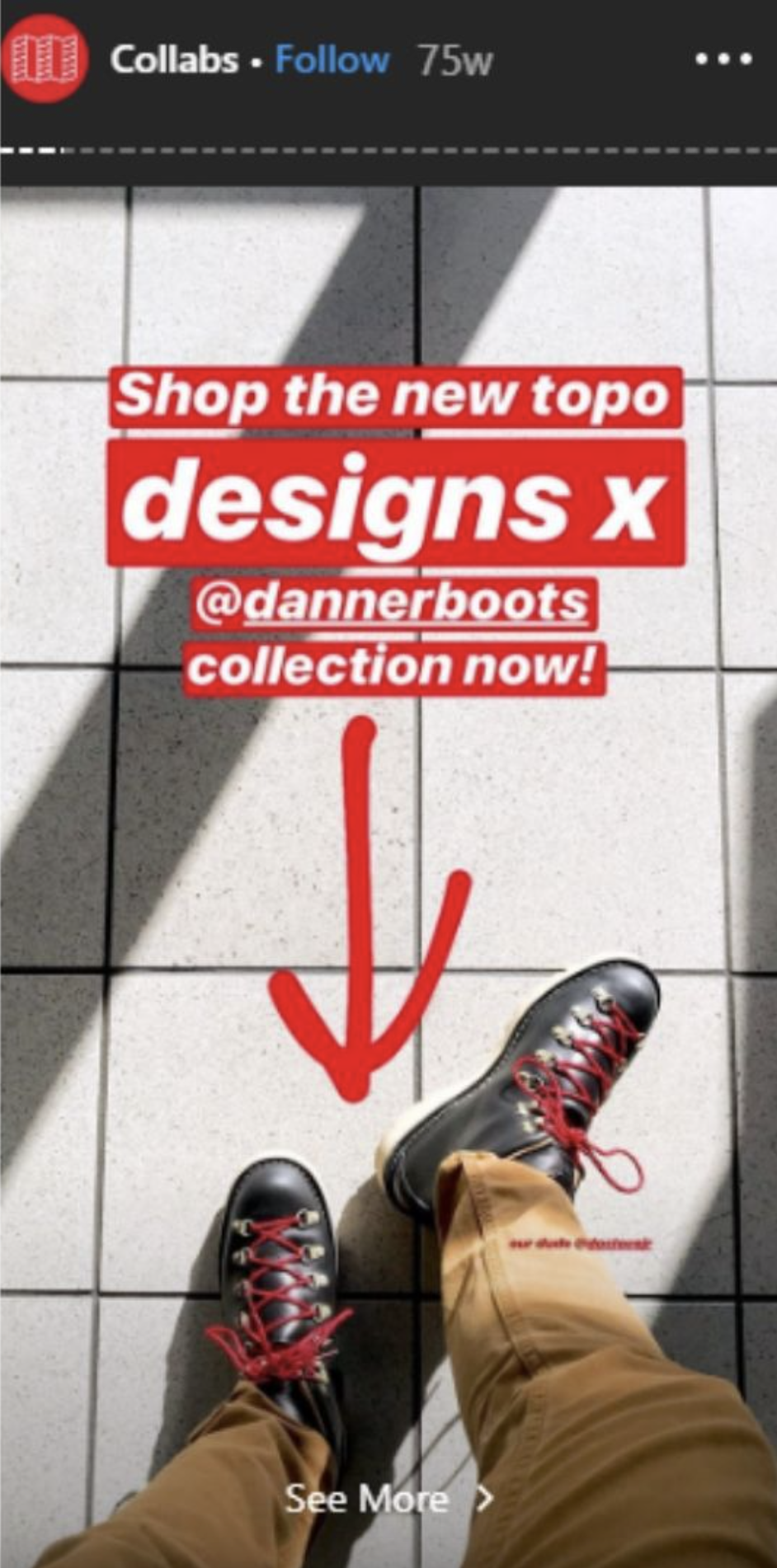
5. Work with creators and influencers
Social media influencers are a trusted bunch for consumers. In fact, 80% of consumers have bought a product based on a recommendation from an influencer. To capitalize on this trend, look for micro-influencers who charge a fraction of what big celebrities ask to post on Instagram. The smaller, more niche audiences of these influencers are more likely to consider your products, especially when their favorite creator is vouching for your brand.
Surepi partnered with beauty influencers and asked them to film 15-second Stories for its branded ad campaign. The result was a 51% higher return on ad spend and a 47% lower cost per purchase.
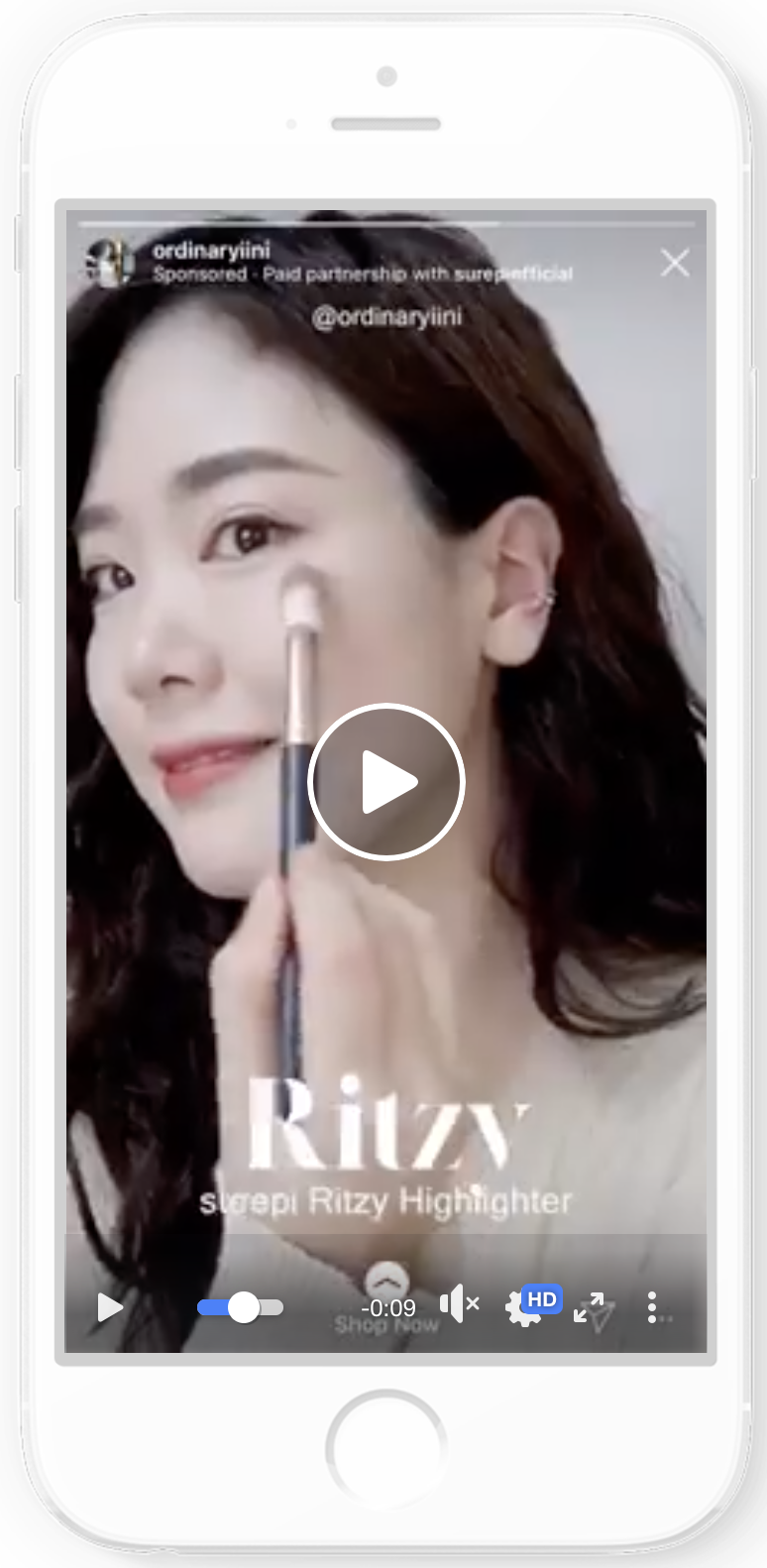
6. Build custom audiences
If you want to retarget people who already know about your brand, set up a custom audience for your ad campaign. Instagram allows you to create different lists based on:
- Website traffic: consumers who have visited your website (install the Facebook pixel to see this data)
- Email subscribers: shoppers on your email list (a minimum of 100 subscribers is needed to build out a custom audience)
- Offline activity: consumers who have visited you in-store
- Social media engagement: people who have engaged with your content on Instagram
- App installs and activity: shoppers who have been active on your mobile app
Now get out there and tell a great story
When it comes to Instagram Story ads, the name of the game is creating awesome content that gets your audience’s attention and makes them curious about your brand. From sale promotions to influencer partnerships to interactive polls, there are tons of options to help achieve all of your business goals. And the best part is: you can have fun while you do it.
Start selling online now with Shopify
Start your free trial



Want to learn more?
- LinkedIn Ads: How to Get Started With Your First Campaign
- TikTok Ads: Everything You Need to Know to Get Started
- The Complete Guide to Using Snapchat Ads With Shopify
- How to Use Twitter Influencers to Boost Ecommerce Sales